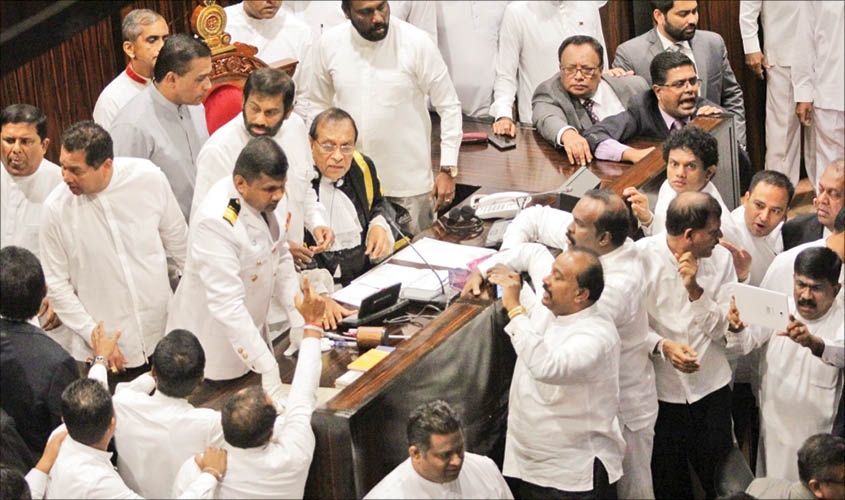SC has clipped Maithripala’s presidential wings, the country has two PMs and a besieged Speaker.
The political confusion in Sri Lanka is amazing and disconcerting. The country’s President, Maithripala Sirisena is helplessly groping in the dark, the Supreme Court has clipped his presidential wings, the country has two Prime Ministers, a besieged Speaker and a bewildered people.
The grave crisis was caused by President Maithripala falling out with his Prime Minister, Ranil Wickremesinghe, the most experienced, astute, popular and sophisticated Sri Lankan politician. He is well known and well liked in India and beyond. Out of the blue, former President Mahinda Rajapaksa was appointed as Prime Minister. When he was asked to prove his majority in Parliament, he could not do so. The majority of members were with Ranil Wickremesinghe. The President adjourned Parliament. The Supreme Court overruled him. Mahinda Rajapaksa refused to resign and let loose his hot heads to attack the Speaker, Karn Jayasuriya, a member of Wickremesinghe’s United National Party (UNP). The photograph of the fracas in Sri Lankan Parliament reminds me of similar scenes in Parliaments of Japan, South Korea and in the Uttar Pradesh Assembly.
The chaos degenerated into semi-violent fisticuffs between parliamentarians of the two groups. Prime Minister number two, Mr Rajapaksa wants fresh elections. This has further aggravated the crisis.
I might also mention that Mr Rajapaksa quit the Sri Lanka Freedom Party led by President Sirisena and joined his brother’s party, Sri Lanka Podujana Peremuna. Here, I feel like giving up. India cannot.
What does India do? Wait and watch. For how long? Intervene? Out of the question. Ignore? Can we afford to do so? Hardly. Sri Lanka is a strategically located friendly neighbour. Developments in Sri Lanka have an impact in Tamil Nadu—remember the LTTE and Prabhakaran, the vicious and brutal leader of Sri Lankan Tamils? What about China’s developing interest in the island and Mahinda Rajapaksa’s not so concealed pro-China proclivities?
This is where the need for skilled and wise diplomacy comes in. I am aware that diplomacy does not provide salvation. It does provide hope. We have many Sri Lanka experts in the IFS past and present. Among the past Sri Lanka experts we have several brilliant, accomplished former high commissioners with penetrating minds and deep understanding. I trust government is in touch with them. If not, do contact them. Prolonged instability in Sri Lanka cannot be in our interest.
***
When I was born, the British Empire covered 1/5th of the surface of the globe. India’s national anthem was “God Save the King”. A hundred thousand Brits ruled a country of three hundred million. Most were racist, arrogant, insensitive and rude. The memsabs were insufferable. Their contribution to the downfall of the British Empire was considerable.
Today, Britain is a B class power. Rich, civilised, highly developed, but in the middle of the high table of the very influential countries. Yet, it must be accepted that Britain has left durable democratic, educational, scientific, industrial, institutions in every part of its former empire. The most useful is the English language, now generally accepted as the world’s lingua franca.
Three days ago, I watched the Brexit debate in the House of Commons. It lasted five hours. The beleaguered Prime Minister, Theresa May stood her ground, but the House of Commons was not with her. The European Union is both condescending and not so subtly patronising. It is yet to be seen whether May survives or not, but Britain’s clout diminishes by the day. It’s all so un-British. Will the United Kingdom stay united, or will Scotland and Wales become separate entities, both independent but united by a common language?
I played a minor role in the process that led to the liquidation of British Empire in several British colonies as a member of the UN Committee on Decolonisation. Most of these colonies were in Africa. This was in the early 1960s. Zambia was Northern Rhodesia; Zimbabwe, Southern Rhodesia; Namibia, South West Africa; Botswana, Bechuanaland; Malawi, Nyasaland and so on. Before I left the UN in 1966, almost all had gained independence except Namibia.

